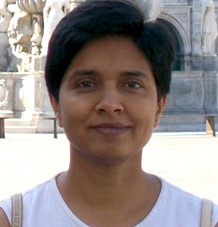NSF Award from the Office of CyberInfrastructure
Collaborative Research: Petascale algorithms for multi-body, fluid-structure interactions in viscous incompressible flows
- Principal Investigator: Anshu Dubey, Senior Scientific Programmer, Advanced Simulation and Computing Center for Astrophysical Thermonuclear Flashes, The Department of Astronomy and Astrophysics
- Start Date: September 1, 2009
- Total Award Amount: $449,530
Project Description
The primary objective of this collaborative study is to develop petascale tools applicable to multi-body, fluid-structure interactions in laminar and turbulent flows. Numerical simulations of fluid flows interacting with dynamically, complex-shaped, moving boundaries are among the most challenging problems in computational mechanics. Petascale machines in the near future can tackle large-scale fluid problems involving the interaction of millions of deformable bodies but involve two significant challenges: i) achievement of high-performance on multi-core processing nodes with small memory per core and ii) development of strategies to address the complexity of load balancing and scaling due to the sheer number of processing elements.
In the proposed work a multidisciplinary team from the University of Maryland and the University of Chicago with expertise in computational mechanics, multiscale modeling and parallel computing will address the above issues and develop scalable algorithms and software. The PIs will directly target applications in dense suspensions of deformable particles, such as whole-blood simulations from first principles.
The proposed work will make available to the broader computational mechanics community an open source fluid-structure interaction, petascale solver. This will enable research on unexplored problems in complex suspensions of rigid and/or deformable particles that are ubiquitous in biosystems. The results of the blood flow simulations, or example, will enable the development of better hemolysis and thrombosis models in the short term and therefore blood-compatible cardiovascular devices in the long term. This can have significant impact on healthcare. In terms of education, the project will provide training and research opportunities for high school and undergraduate research assistants, as well as additional summer outreach internships.
This award is funded under the American Recovery and Reinvestment Act of 2009, NSF Award number: 0905059

Anshu Dubey,
Senior Scientific Programmer, Advanced Simulation and Computing Center for Astrophysical Thermonuclear Flashes, The Department of Astronomy and Astrophysics
